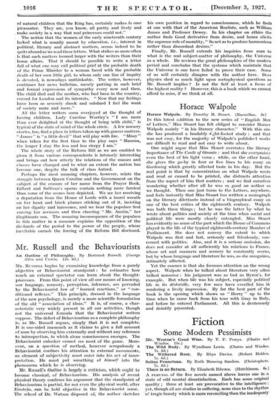Mr. Russell and the Behaviourists
MR. RUSSELL begins by examining knowledge from a purely objective or Behaviourist standpoint : he estimates how much an external spectator can learn about the thought- pnicesses. From this pOint of view all our means of knowing, our language, memory, perception, inference, are pervaded by the Behaviourist law of " learned reactions," 'or " con- ditioned reflexes."' This principle, dressed in the language Of the new psychology, is merely a more scientific formulation of the old " association of ideas." - It is, of course, a char- acteristic very widely present in all our activities, though not the universal formula that the Behaviourist writers suppose. The defect of Behaviourism as a complete philosophy is, as Mr. Russell argues, simply that it is not complete. It is one-sided inasmuch as it claims to give a full account of man by observing him externally and without any reference to introspection, in which alone consciousness emerges. The Behaviourist onlooker cannot see most of the game. More- over, on a question of method, however scrupulously a Behaviourist . confines his attention to external movements. an element of subjectivity must enter into his act of inter- pretation. He must put something of himsq into the phenomena which he is observing.
Mr. Russell's Outline is largely a criticism, which ought to become classical, nf Behaviourism. His analysis of recent physical theory confirms his argument that the standpoint of Behaviourism, is partial, for not even the physical world, after Einstein, can be held objective in the Behaviourist sense. The school of Dr. Watson disposed of, the author sketches his own position in regard to consciousness, _which he finds at one with that of the Ainerican Realists,- such as William James and Professor Dewey. In his chapter on ethics the . author finds Good derivative from desire, and hence elicits the supreme rule of morality, " So act as to produce harmonious rather than discordant desires." .
Finally, Mr. Russell extends his inquiries from man to what is the real subject-matter of philosophy, the Universe as a whole. He reviews the great philosophies of the modern period and concludes that the systems which maintain that the Universe is one have failed to prove their case. Some of us will certainly disagree with the author here. Does physics shed so much light upon metaphysical questions as Mr. Russell implies ? Is not the Self at least a focus of the highest reality ? However, this is a book which we cannot afford to miss, if we think at all.










































































 Previous page
Previous page